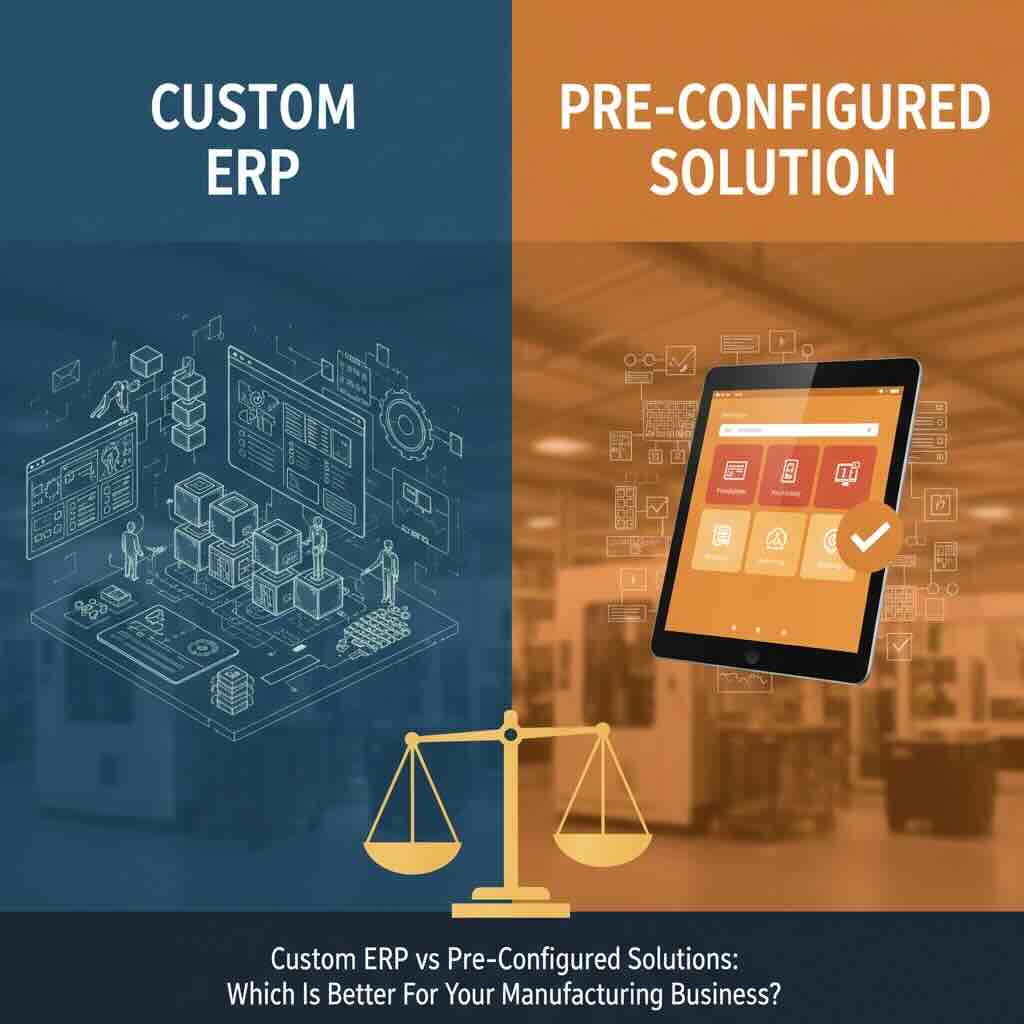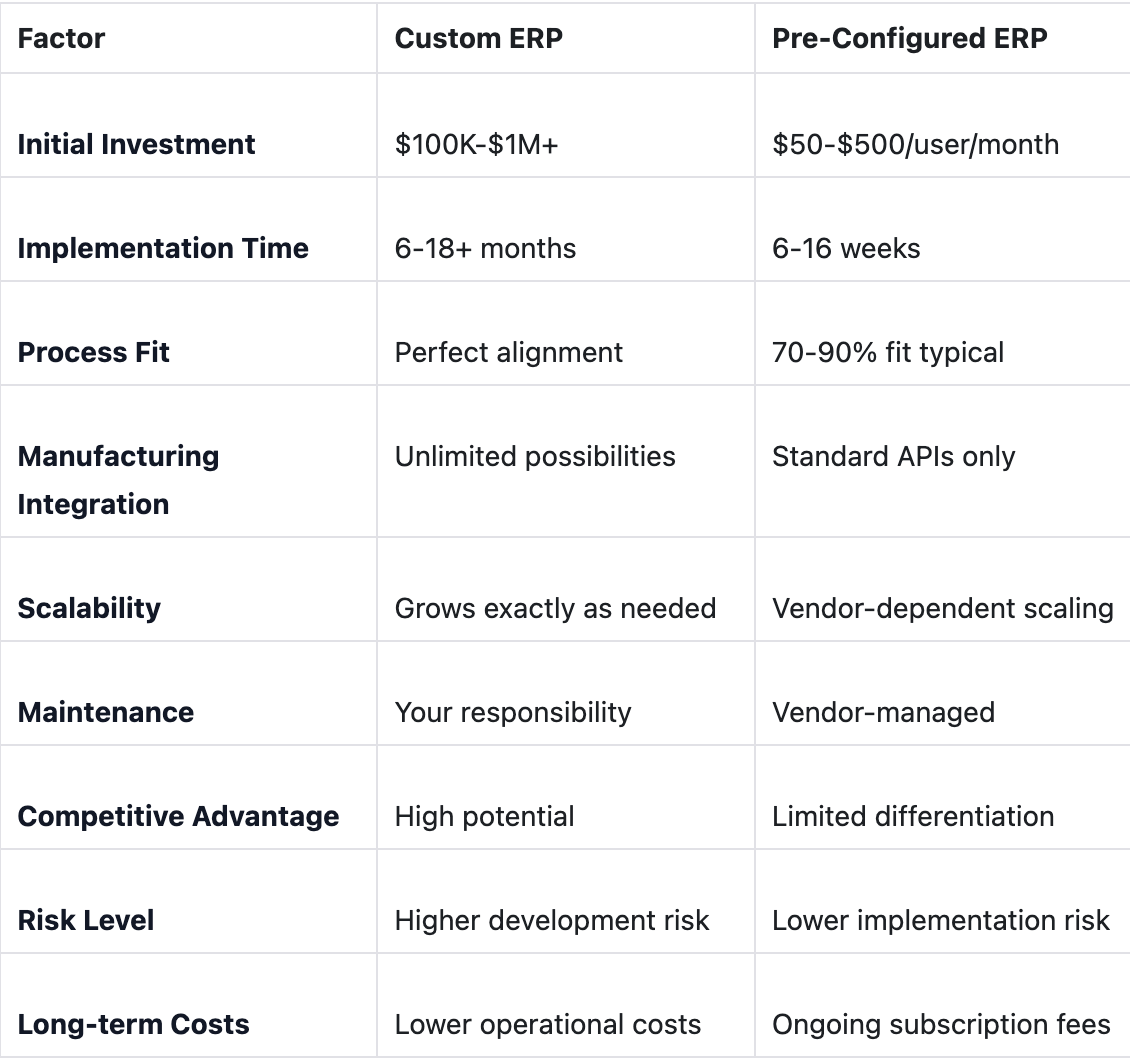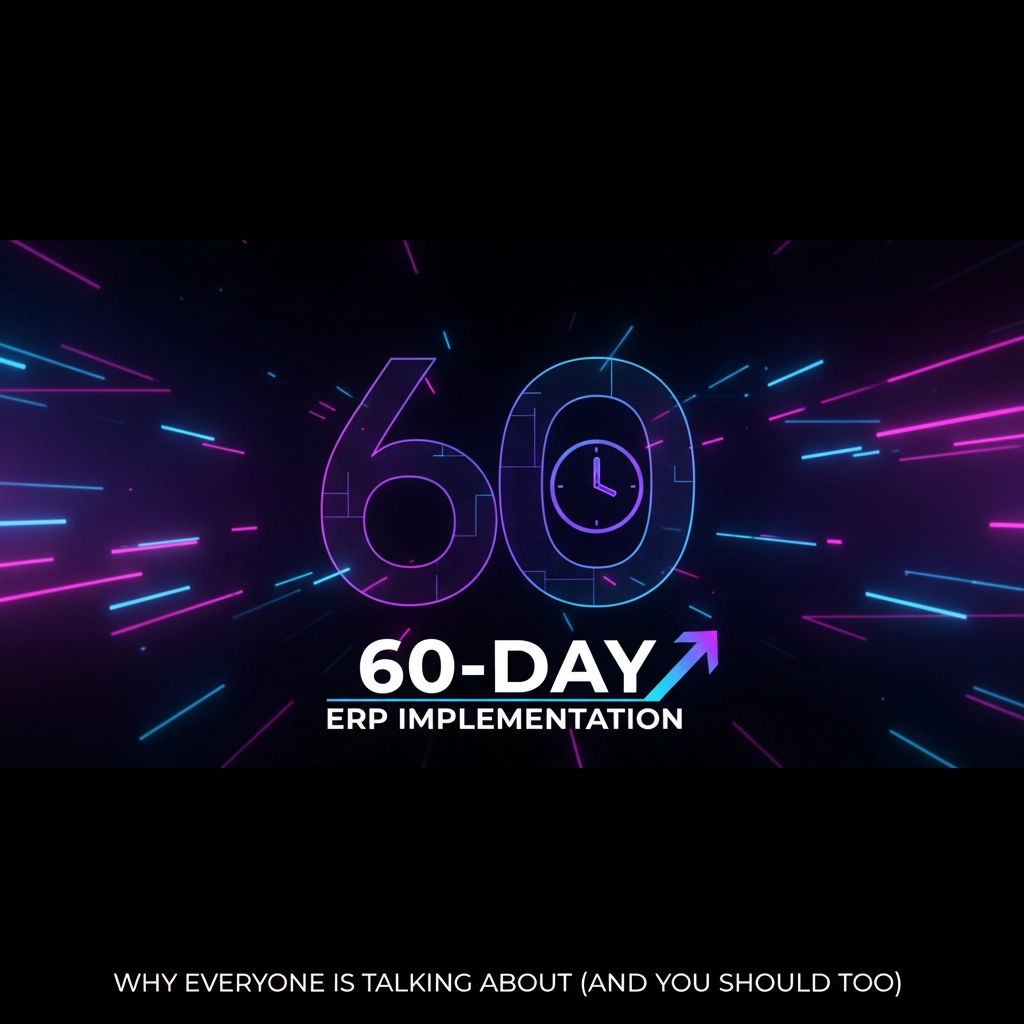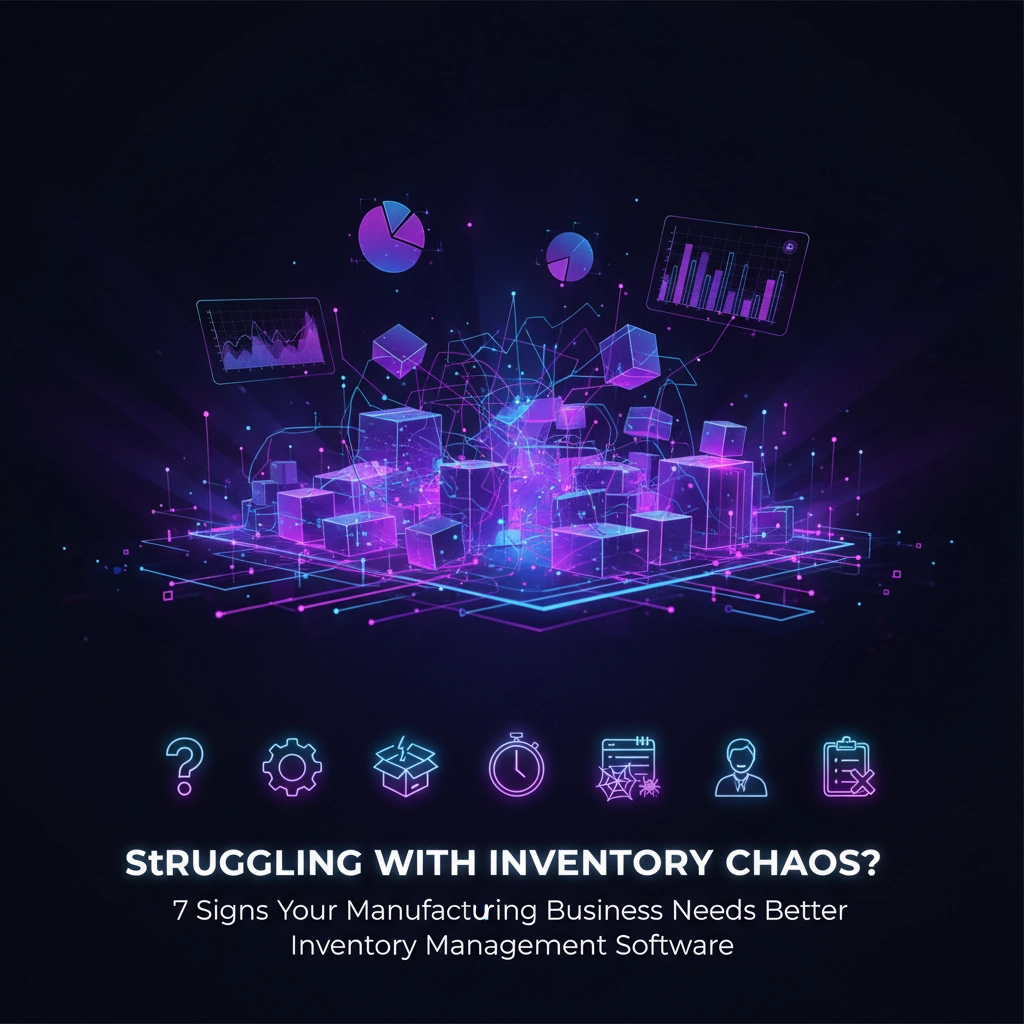Custom ERP vs Pre-Configured Solutions: Which Is Better For Your Manufacturing Business?
The choice between a custom ERP solution and a pre-configured system isn't just about software: it's about aligning your technology infrastructure wi
Founder & CEO

When it comes to choosing an ERP system for your manufacturing business, you're facing one of the most critical technology decisions that will impact your operations for years to come. The choice between a custom ERP solution and a pre-configured system isn't just about software: it's about aligning your technology infrastructure with your manufacturing processes, growth plans, and competitive strategy.
Manufacturing businesses operate in a unique environment where production workflows, inventory management, batch tracking, and regulatory compliance create complex requirements that generic software often struggles to address. This complexity makes the ERP selection process particularly challenging, as the wrong choice can lead to inefficient workarounds, productivity bottlenecks, and missed growth opportunities.
Understanding Custom ERP Solutions
Custom ERP systems are built from the ground up to match your specific manufacturing processes, workflows, and business requirements. Rather than adapting your operations to fit pre-built software, custom solutions adapt to how you actually run your business.
Core Strengths of Custom ERP
Process Integration Excellence
Custom ERP systems excel at integrating with your existing manufacturing workflows, approval chains, and compliance requirements. If your production line uses specialized machinery or follows unique quality control processes, a custom solution can be designed to capture and optimize these exact workflows without forcing compromises.
Competitive Differentiation
When your ERP system is built specifically for your operations, it becomes a competitive advantage rather than a commodity tool. Custom solutions can support proprietary manufacturing methodologies, unique inventory strategies, or specialized reporting requirements that give you an edge in your market.
Long-term Scalability Control
Custom systems grow with your business on your terms. As you expand production capacity, add new product lines, or enter new markets, your ERP can evolve to support these changes without the limitations imposed by pre-built frameworks.
Advantages of Custom ERP
Perfect Process Alignment: Every feature serves your specific needs, eliminating the productivity drain of working around software limitations.
Unlimited Integration Potential: Custom systems can connect with any existing equipment, legacy systems, or third-party tools your manufacturing operation depends on.
Ownership and Control: You own the intellectual property of your system and aren't dependent on vendor roadmaps or licensing changes.
Superior ROI Over Time: Despite higher upfront costs, the efficiency gains and competitive advantages often deliver significant long-term returns.
Disadvantages of Custom ERP
Higher Initial Investment: Custom development requires substantial upfront costs for design, development, testing, and deployment.
Extended Implementation Timeline: Building a system from scratch typically takes several months to over a year, depending on complexity.
Ongoing Maintenance Responsibility: You'll need dedicated technical resources or vendor partnerships to maintain, update, and support your custom system.
Development Risk: Custom projects carry the inherent risk of scope creep, timeline delays, or technical challenges that don't exist with proven solutions.
Exploring Pre-Configured ERP Solutions
Pre-configured ERP systems come with built-in modules, workflows, and features designed to serve common manufacturing needs. These solutions offer established functionality that can be deployed quickly with minimal customization.
Core Strengths of Pre-Configured ERP
Rapid Deployment Capability
Pre-configured systems can often be implemented in weeks rather than months, allowing you to start realizing benefits immediately. This speed advantage is particularly valuable for growing businesses that need operational improvements quickly.
Proven Functionality
These solutions have been tested across thousands of implementations, with bugs worked out and best practices built in. You benefit from the collective experience of the vendor's entire customer base.
Cost Predictability
Subscription-based pricing models make costs predictable and typically require lower upfront investment compared to custom development projects.
Advantages of Pre-Configured ERP
Lower Initial Costs: Subscription models spread costs over time and require minimal upfront investment.
Established Best Practices: Built-in workflows often incorporate industry best practices that can improve your operations.
Vendor-Managed Updates: Software updates, security patches, and feature additions are handled by the vendor.
Faster Time-to-Value: Quick implementation means you start seeing operational benefits sooner.
Disadvantages of Pre-Configured ERP
Limited Customization Options: You may need to change your processes to fit the software rather than the other way around.
Feature Gaps: Standard solutions may lack specific functionality your manufacturing processes require.
Integration Limitations: Connecting with specialized equipment or legacy systems may be challenging or impossible.
Ongoing Subscription Costs: While initial costs are lower, long-term subscription fees can add up significantly over time.
Detailed Comparison Analysis

Making the Right Choice for Your Manufacturing Business
Choose Custom ERP If:
Your manufacturing operation involves complex, non-standard processes that require unique workflows, specialized reporting, or proprietary methodologies. Companies with complex bill of materials management, intricate batch tracking requirements, or specialized quality control processes often find pre-configured solutions inadequate.
You have rapid growth with evolving needs. If your business is expanding quickly and your processes are still evolving, a custom solution can adapt as you grow rather than constraining your development.
Integration requirements are complex. When you need to connect with specialized manufacturing equipment, legacy systems, or unique third-party tools, custom solutions provide unlimited integration possibilities.
You can invest in long-term competitive advantage. If ERP capabilities could differentiate your business in the marketplace, the investment in custom development may pay dividends through improved efficiency and unique capabilities.
Choose Pre-Configured ERP If:
Your manufacturing processes are relatively standard and align well with common industry practices. Many discrete manufacturers with straightforward production workflows find that pre-configured solutions meet 80-90% of their needs effectively.
Speed is critical for your business success. If you need operational improvements immediately and can't wait for custom development, pre-configured solutions deliver faster time-to-value.
Budget constraints limit your technology investment. When upfront capital is limited, subscription-based pre-configured solutions provide access to sophisticated ERP capabilities with lower initial costs.
You prefer vendor-managed maintenance. If you lack internal IT resources or prefer to focus on manufacturing rather than software maintenance, pre-configured solutions remove this burden.
The Hybrid Approach
Many successful manufacturing companies start with a pre-configured solution that offers extensive configuration options. This approach allows you to adjust the system within its framework while maintaining upgrade compatibility and cost efficiency. As operations grow more complex, you can evaluate transitioning to custom solutions or implementing custom modules alongside your core system.
At Thruline we've designed our ERP to be flexible enough to match our customer's requirements, while maintaining the speed and ease of maintenance of out of the box solutions.
Strategic Implementation Considerations
Regardless of which path you choose, successful ERP implementation requires careful planning around data migration, user training, and change management. Manufacturing businesses face unique challenges during ERP transitions, including maintaining production schedules, preserving quality control processes, and ensuring regulatory compliance throughout the implementation period.
Consider your team's technical capabilities, as custom solutions typically require more sophisticated internal resources or stronger vendor partnerships for ongoing support. Pre-configured solutions usually come with more comprehensive user documentation and training resources.
Conclusion
The choice between custom and pre-configured ERP solutions ultimately depends on your specific manufacturing requirements, growth trajectory, and strategic objectives. Complex, unique manufacturing processes with specialized requirements often justify custom development, while standard operations benefit from the speed and proven functionality of pre-configured solutions.
Remember that this decision will impact your operations for many years. Take time to thoroughly evaluate your current processes, future plans, and technical requirements before making your choice. The right ERP system becomes a foundation for growth, efficiency, and competitive advantage in your manufacturing business.
For manufacturing businesses ready to explore the best of both worlds, Thruline offers tailored manufacturing ERP systems that have the speed of an out of box solution, but the benefits of a custom ERP - allowing us to grow with your business requirements.
Subscribe to our newsletter today
Subscribe to our mailing list for updates and insights. No spam.





